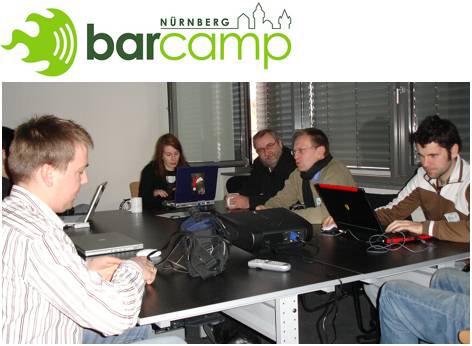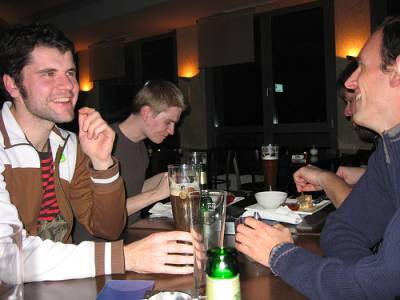Monday, December 18, 2006
Barcamp Nürnberg

This weekend, I was at the Barcamp Nuremberg, Germany’s third Barcamp after Berlin and Cologne. A Barcamp is an “unconference”, inspiring ad hoc knowledge sharing sessions and discussions as opposed to rigid, predetermined lectures. Not only are sessions created dynamically – of the 70 or so people, everyone tells what they know, or are interested in, and then post-its are attached on a whiteboard containing the two-day time table – they are also working more like a roundtable with loose moderation. So instead of 50 seated people having to listen to 1 stand-up lecturer for 10 minutes, like on Web Mondays (which have become a regular occurrence in Germany’s bigger cities), it’s more like personal seated presentations, with questions allowed anytime... or alternatively, just a dozen people discussing a topic for 45 minutes, with 1 or 2 persons keeping the discussion on track. And I gotta say I like this discussion style a lot more than other conferences I’ve been to. The interactivity just makes it more natural.
What did everyone talk about the two days? Well, we learned about the differences between Asian social networks and Western-style ones, for example. For one thing, Oliver Ueberholz told us, Japanese and Chinese traditionally don’t mind the copying of other people’s work... in fact, they honor it, because in the history of their big empire often copying was the only way to make sure tradition is maintained cross-country. Thus, the most popular Chinese social network site may look just like the most popular Japanese social network site – including colors, navigation items, etc. – yet no one will complain.
The biggest difference however for Japanese social network sites may be that Japanese like to stay anonymous on those boards (also see the previous post on 2ch.net). Because, Oliver told us, many Japanese users are afraid of the “great unknown” of web sites and web surfing; afraid that someone might watch them, afraid the web technology may not treat them well, afraid of what happens behind the scenes. And because traditionally, the Japanese society imposes a strict rule set that predetermines your place in life... something anonymity seems to escape.
The process of signing up goes like this; a friend of yours refers you to the invite-only social network. But an invitation, as opposed to a common Western-style procedure of social networks where you basically invite everyone who asks you (as much as time allows), is a commitment to the invited person... you’re basically promising that this person won’t do any bad in the social network, e.g. troll in the network’s forums. If they do, however, not only will they be kicked... you as inviter might now be kicked as well! (There’s even a kind of double opt-in on the Chinese variant of the board, because your friend must not only invite you and wait for you to follow-up on the invitation, they must also approve the invitation again after you did... after all, chatting about you with friends, they might’ve heard something bad and might want to revert their initial judgment.)
Once the user is in the message board, they won’t do what many people in Germany or Europe, the US, and many other places might do now, which is to load up a photo and enter their real name somewhere. No, mostly the profile of the Japanese social network user will now contain an anime character, a picture of a dog, or something else non-personal which will make sure anonymity is preserved. Also, the Japanese users, Oliver emphasized, will never start talking about themselves in the forum, really, in particular not boast about themselves (at least, that’s considered rude, and rudeness will be punished with ignoring the poster). Praise is left exclusively to others who judge oneself in the forum. In other words, saying “I made a cool new website” may be taboo, whereas someone else saying “XYZ made a cool new website” may be perfectly fine.
This was just one of the many topics on the Barcamp Nuremberg. There were many, many other interesting & inspiring discussions going on – the Barcamp program table gives an overview – including discussions on Second Life’s future with Nicole Simon, discussions of the political webscape in Germany with an example of “anti campaigning” (followed by the decision that we need an internet lobby in Germany to influence web politics, to be further defined at future Barcamps), web security in the age of AJAX and such, a discussion of info work flows of full-time bloggers (where Oliver Gassner and I talked about filling a blog with content on daily basis), questions on Google (people asked me about topics like Google China’s censorship, Google’s future, Google’s competition, Google result quality – or lack thereof – and the role of the Semantic Web in all this), and web- and book-author Patrick Schnabel talking about optimizing Google AdSense (his conclusion: chronologically presented content, typical of weblogs, is the death of good click rates... mainly because it lacks context. Patrick’s approach is to combine traditional blog software with chronologically ordered “category” pages presenting past blog posts’ content on a topic all on one page, similar to what you may do with tags, but not quite).
Oh yeah, and we played some Wii too (rather simple graphics and the 3D sprites don’t completely respect whatever it is you’re doing to your controller – mostly frantically waving it around – but a sweet console nevertheless). I’ll try to catch the next Barcamp too...

Some drinking 1.0...
[First photo by Lars with some rights reserved. Second pic Creative Commons-licensed by Michael Herrling. Thanks Tim Bonnemann!]
>> More posts
Advertisement
This site unofficially covers Google™ and more with some rights reserved. Join our forum!
